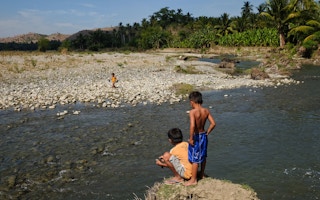United Nations (UN) secretary general Antonio Guterres warned on Thursday that the era of global warming has ended and “the era of global boiling has arrived” after climate scientists released a report that July was the world’s hottest month on record.
To continue reading, subscribe to Eco‑Business.
There's something for everyone. We offer a range of subscription plans.
- Access our stories and receive our Insights Weekly newsletter with the free EB Member plan.
- Unlock unlimited access to our content and archive with EB Circle.
- Publish your content with EB Premium.
“The heat is unbearable and the level of fossil fuel profits and climate inaction is unacceptable. Leaders must lead, no more excuses, no more waiting for others to move first. There is simply no more time for that,” Guterres told a media conference at the UN headquarters in New York.
The first three weeks of July are set to be the warmest three-week period on record and this month is on track to be the hottest July since 1940, when analysis of global climate started to be documented, according to a study published on Thursday by European Union-funded Copernicus Climate Change Service (C3S).
“Anthropogenic emissions” of carbon dioxide associated with human activities such as the burning of fossil fuels, deforestation and land use changes are driving the long period of unusually high sea surface temperatures and El Niño conditions causing the exceptionally warm July, according to the C3S report.
Guterres called on leaders to “step up for climate action and climate justice”, particularly those from the G20 leading industrial nations, responsible for 80 per cent of global emissions.
He cited the 28th session of the Conference of Parties (COP28) in Dubai in November as a “critical opportunity” for rich countries to honour commitments to provide US$100 billion a year to developing countries for climate support.
Poor nations were promised US$100 billion a year in climate finance by 2020 by developed country governments more than a decade ago. But rich countries will continue to miss the longstanding pledge and reach US$95 billion per year at most by 2025 – five years late and still woefully short of the required amount.
The Portugese diplomat who has served as the UN’s climate chief for the past seven years, also sought for the loss and damage fund to be operational at COP28.
The loss and damage fund, agreed upon at last year’s climate conference, is designed to help vulnerable countries recover from climate disasters. Transitional committee meetings have been ongoing throughout the year, where details of the fund are expected to be finalised in time for the November climate talks.
Extreme temperatures in Asia
The high temperatures in July brought record-breaking extremes, especially in Asia.
China saw its highest recorded temperature, triggering cities across the nation to open their air raid shelters to offer residents relief from the heat. In the Philippines, heatwaves left two dead and caused water levels to plummet in reservoirs, threatening harvests.
As well as the sweltering heat, July brought record rainfall and fatal flooding in Japan, India, and China.
In South Korea, dozens were killed when their cars were trapped in a flooded tunnel while a record monsoon downpour led to a landslide that buried 15 and killed eight children during a cricket game in Pakistan.
Limiting global warming to safe levels and accelerating the transition to cleaner, zero carbon fuels was on the agenda for the G20 climate and energy talks in India on 20 July, but current proposals from major emitters are still well off pace, say analysts at Climate Action Tracker, an independent scientific project that tracks government climate action and measures it against the globally agreed Paris Agreement.
Under a new set of plans for COP28 in Abu Dhabi, the summit’s president Sultan Al-Jaber, chief executive of oil giant Adnoc, admitted the phase-down of all fossil fuels is “inevitable” and called for “an energy system free of unabated fossil fuels” by 2050 together with a target to triple renewable energy capacity by 2030.
Yeb Saño, executive director of campaign group Greenpeace Southeast Asia, called for companies responsible for the lion’s share of global historical emissions, who continue to profit from the suffering of communities dealing with death, loss of livelihoods, food and water insecurity on a daily basis to be held to account.
He said: “They must phase out fossil fuel use and pay up for losses and damages from climate impacts. As the world spirals deeper into the crisis, vulnerable countries must raise their voices and demand reparations for the sake of climate justice.”










